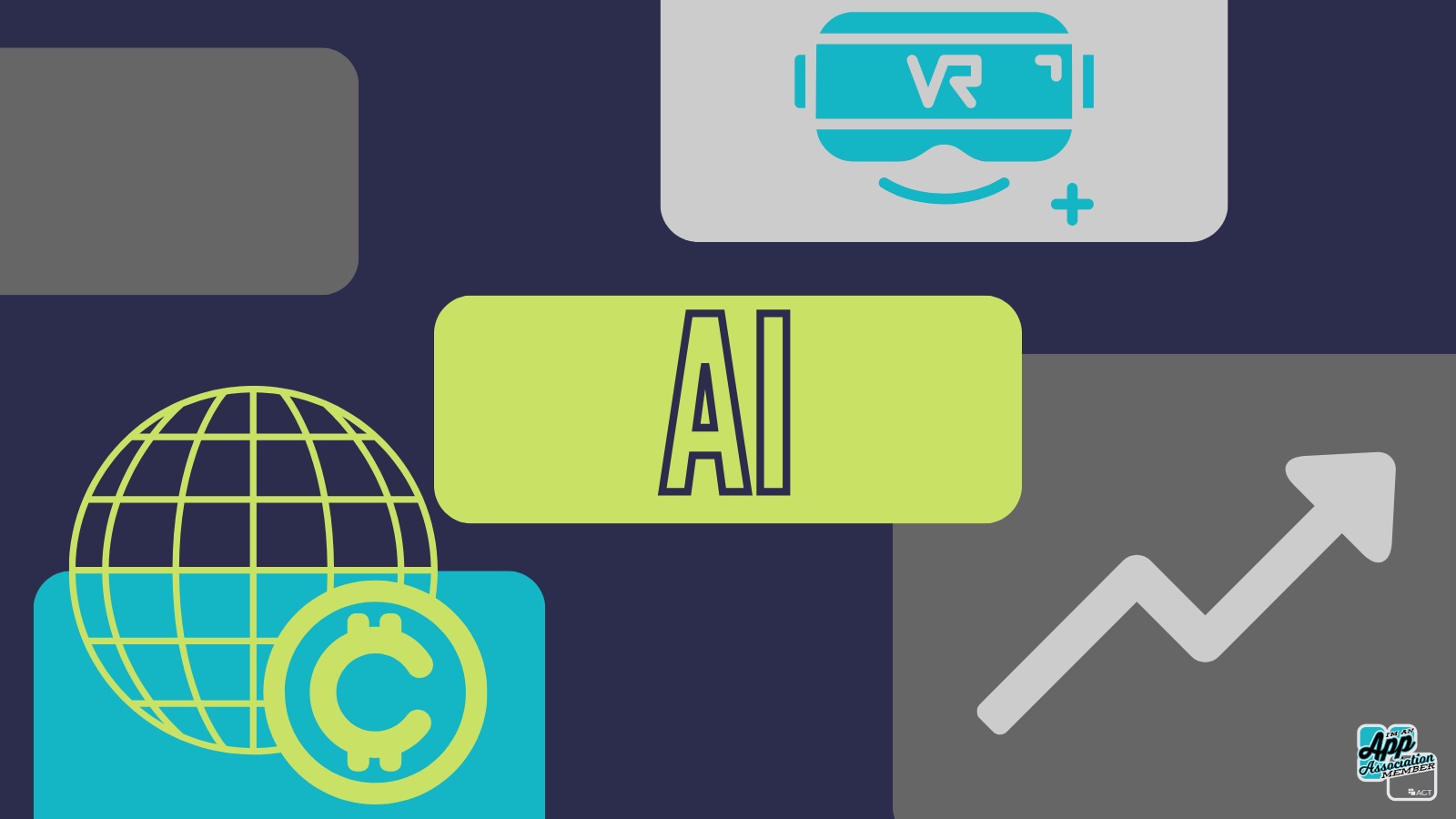Artificial intelligence (AI) is more than just a buzzword; it’s a transformative force shaping industries around the globe. While AI has recently captured the public’s and policymakers’ attention, our ACT | The App Association members have been leveraging its potential for years. As the app economy experiences a surge in AI-driven innovation, these small businesses and entrepreneurs are at the forefront, addressing real-world challenges with groundbreaking applications.
“It’s amazing to see all the novel ways that people interact with AI and how users are using AI concepts like large language models (LLM) in unforeseen ways to solve really incredible problems.” – Marc Fischer, CEO and Co-Founder, Dogtown Media
Small business startups are navigating the vast app ecosystem, carving out niches typically overlooked by larger corporations. Often extremely passionate about advancing technology, smaller enterprises unfortunately face significant policy, legal, cultural, and business development hurdles that could delay a product or brand launch indefinitely. This struggle underscores the need for thoughtful, intentional human oversight in the way that AI is used and how activities involving AI are regulated.
Recognizing the importance of small business voices and insights in regulatory conversations around AI, we have built resources and educational materials to help educate policymakers in this space. Our small business AI report provides insights from focus group sessions with App Association members, emphasizing the synergy between humans and AI and the necessity of human guidance in this evolving field. In addition to this report, our Global AI Policy Principles paper outlines ways to address these challenges and calls upon global leaders to consider the small business perspective when considering policy options centered on AI.
AI and Small Business
Our small business members leverage AI to enhance productivity, streamline operations, and deliver superior customer experiences. For example, Dogtown Media uses AI to develop healthcare apps that can monitor patient health in real-time, providing critical data to healthcare providers. NeuEon, Inc., has found AI invaluable in automating document scanning and summarization, which speeds up processes and ensures content accuracy. RxPlace leverages AI to refine its decision-making algorithms by establishing robust data rules and guidelines.
These companies’ ability to harness and deploy AI tools quickly and without undue corporate red tape or government obstacles demonstrates how startup entrepreneurs are uniquely positioned to harness AI’s transformative power in ways larger enterprises cannot. Their agility allows them to swiftly adapt to marketplace changes and innovate at a pace that bigger organizations might find challenging.
“We’ve found that AI’s ability to scan and summarize documents has been invaluable. It not only speeds up our processes but also ensures we’re capturing the essence of the content.” – Scott Weiner, CTO, NeuEon, Inc.
However, integrating AI is not without its challenges. While the capabilities of integrated AI tools like ChatGPT and Bard are impressive, ensuring their reliability and transparency is crucial. In addition to transparency, the financial burden of adopting these cutting-edge solutions can also be a barrier for smaller enterprises. Challenges such as navigating algorithmic biases and addressing these biases with training techniques based on vast datasets requires expertise and significant investments that might not be readily available in-house, underscoring the importance of strategic partnerships in the AI realm. Accordingly, policymakers should be especially wary of how preemptively blowing the antitrust whistle on burgeoning, competitive markets for LLM and foundation model services would negatively affect small businesses.
Building Trust in AI Systems
In addition to developer challenges, public sentiment towards AI is shifting negatively, as evidenced by recent data showing a decline in Americans viewing AI as “safe and secure.” This change highlights the importance of open dialogue about AI’s strengths and limitations.
“I think a lot of people need education about the way that AI works … But I think once people understand it more, and once there’s more … I think it will have a net benefit to society.” –Suzanne Borders, CEO and Co-Founder, BadVR
Building trust in AI starts with effective communication and education. Instead of using complex jargon or a condescending tone, early AI adopters, creators, and thought leaders should engage in conversations that respect the public’s intelligence and address users’ concerns genuinely. By doing so, our industry can illustrate how AI technology is more likely to improve a user’s daily life than it is to end it. When users – people – feel respected and their concerns are addressed sincerely, they are more likely to embrace AI’s potential. This trust-building approach is crucial for demonstrating AI’s life-saving capabilities and overall positive societal impact.
The Future of Responsible AI in the App Economy
As AI becomes more integrated into business operations, small and medium-sized businesses play a pivotal role in shaping the future. Their experiences highlight the importance of human oversight, transparency, and education in the broader AI narrative.
“We’ve been using AI forever in ways you wouldn’t expect. Ensuring compatibility, data transfer security, and compliance is crucial. We need a clear framework for AI compliance that emphasizes human oversight and legal structure.” – Stephen Forte, Co-Founder and Managing Partner, Fresco Capital
Small businesses and entrepreneurs are an indispensable force in the AI-driven app economy. Their innovative spirit and commitment to responsible AI adoption drive the industry forward. As AI continues to evolve, the contributions of these tech pioneers will be crucial in ensuring a balanced, ethical, and innovative future. Check out our full report for more insights and to understand how our members are leading the charge in AI innovation.
